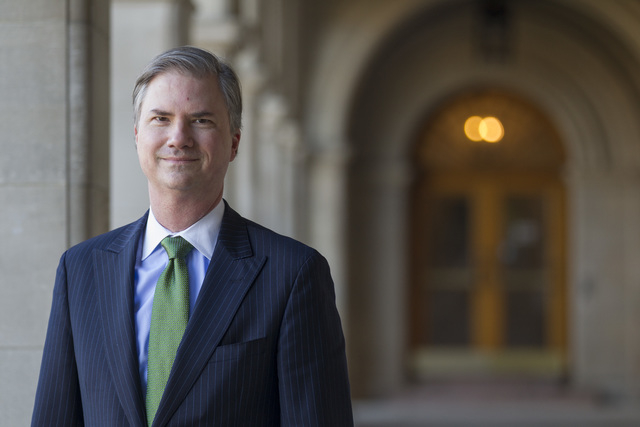Is smaller better for college academic success?

ST. LOUIS — After five scandal-plagued years as University of North Carolina chancellor, Holden Thorp was downright ecstatic to start over on a campus where the term “student-athlete” doesn’t evince snickers and groans.
The new provost at the private Washington University spends little time worrying about academically suspect jocks — as a Division III school, WashU doesn’t even award athletic scholarships. It’s a far cry from Chapel Hill, where an academic fraud investigation found dozens of athletes taking no-show classes, along with assorted other abuses, and led to Thorp’s resignation from the top job at his alma mater — the sole college he applied to as a high school senior in Fayetteville, N.C.
“I wanted to get back closer to the academic side of things,” said Thorp, who arrived in St. Louis three months ago. “Washington University, more than a public university, is on the whole more unapologetically devoted to academic achievement as its primary focus.” For him, “that is a liberating feeling.”
His move down the academic chain surprised many, but Thorp is not alone among college CEOs seeking such refuge, especially those who have weathered the turbulent world of big-time sports. Current and past college presidents, as well as education industry observers, say many campus heads are unprepared for the white-hot glare that campus athletics emit when things go wrong, from player arrests to NCAA investigations and coach firings — or in Thorp’s case, all three.
“There were a lot of misconceptions about college sports,” Thorp said, alluding to the notion that at UNC, the quest for athletics success would never compromise the school’s academic standards. “In some ways, I was as much a part of this as anybody, protecting people from some of the tough truths about college sports.”
In a report last year by the American Council on Education, nearly one-quarter of the more than 1,600 college presidents surveyed said they were also unprepared for the rigors of fundraising — whether for academics or athletics.
At Syracuse University, president and chancellor Nancy Cantor is headed to the much smaller Newark, N.J., campus of Rutgers, two years after firing an assistant basketball coach who’d been accused of sex crimes but never charged.
Former University of Colorado president Betsy Hoffman, who left Boulder amid a football recruiting controversy, resurfaced as provost at Iowa State and is now an economics professor. And Martha Saunders, who left the University of Southern Mississippi after an athletics audit found a $1 million shortfall, quietly became provost at the University of West Florida, the school where her academic career began three decades ago as a public relations professor.
“What I miss least is not having any control over my own life,” said Saunders, who said she wanted a change after five years in charge at Southern Miss. “College presidents are on the job 24-7, especially in a small town.” With public funding declining, presidents must spend more time raising private funds.
Insiders in academia are hesitant to label such transitions as a trend, noting the uniqueness of each situation and varied circumstances of people moving into and out of top college jobs.
“There are many kinds of second acts that we see,” said Molly Corbett Broad, a former University of North Carolina system president who now leads the American Council on Education.
But Broad and her colleagues acknowledge that leadership stints now tend to be shorter. The average stay is seven years, down from 8.5 six years ago, according to the latest data.
Recent research by The Council of Independent Colleges, an association of 640 small and mid-sized schools, similarly found a growing hesitation among other academics to move up into the top jobs.
Among provosts, Broad said, “many of them are having second thoughts about whether (leadership) is the life they would choose.”
Cantor, a New York native, said her move is about getting back to “what it is I really want to work on,” citing the public benefits of making the Rutgers campus part of Newark’s revitalization efforts.
In his new job, Thorp said he hopes to boost Washington University’s entrepreneurial efforts, tapping his own expertise as the founder of several companies formed from his work developing electronic DNA chips. He’s reflective about his time at North Carolina.
“As far as Carolina is concerned, I think they’re in a good place,” Thorp said. “But it wasn’t easy. Carolina has come to terms with a lot of the complications of intercollegiate athletics that weren’t there before.”
Saunders said she regularly hears from colleagues curious about her return to academic management. She called the days of campus leaders with open-ended tenures “just over.”
Presidents now leave early enough to have time for new careers, she said.
“We still have gas in the tank,” she said. “I think we’ll see more and more of this.”
———
Follow Alan Scher Zagier on Twitter at http://twitter.com/azagier












